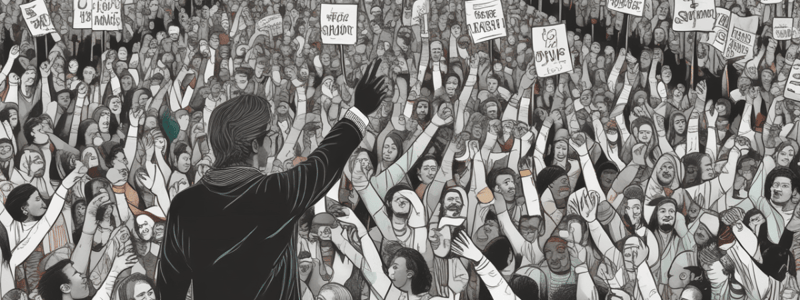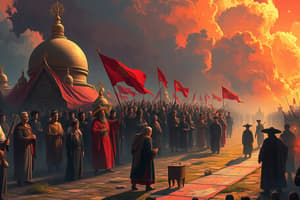Podcast
Questions and Answers
What is the focus of social movement and political science research?
What is the focus of social movement and political science research?
- The history of political science
- Electoral behaviors and large opinion polls
- A specific time of political participation (correct)
- The complexity of civic activism
Why has there been periods of disinterest in social movement research?
Why has there been periods of disinterest in social movement research?
- Because it's a form of political participation that concerns a minority of individuals (correct)
- Because it's easily analyzed through large opinion polls and surveys
- Because it's a less important subject in the field of research
- Due to the lack of diversity in denominations
What can be referred to with different phrases or names?
What can be referred to with different phrases or names?
- Political behaviors and collective action
- Political sciences and social movements
- Civic activism and electoral behaviors
- Social movement, collective action, mobilization, protest, contentious politics (correct)
What has been labelled differently over time?
What has been labelled differently over time?
When did research on social movements and political science start?
When did research on social movements and political science start?
What is the result of the diversity of names in social movement research?
What is the result of the diversity of names in social movement research?
What occurs when the level of expected goods remains constant, but the level of accessible goods declines?
What occurs when the level of expected goods remains constant, but the level of accessible goods declines?
According to the relative frustration approach, which of the following is an example of the frustration of rising aspirations?
According to the relative frustration approach, which of the following is an example of the frustration of rising aspirations?
What is the term for the divergence between the expected goods and what can be gained?
What is the term for the divergence between the expected goods and what can be gained?
What is a necessary condition for specific collective action to emerge, according to Gurr?
What is a necessary condition for specific collective action to emerge, according to Gurr?
What is the limitation of the relative frustration approach?
What is the limitation of the relative frustration approach?
What are the factors that the relative frustration approach allows to better identify?
What are the factors that the relative frustration approach allows to better identify?
What was Mancur Olson's fundamental change of perspective in his book 'The Logic of Collective Action'?
What was Mancur Olson's fundamental change of perspective in his book 'The Logic of Collective Action'?
What is the underlying assumption of Mancur Olson's theory?
What is the underlying assumption of Mancur Olson's theory?
What is the conclusion of Olson's reasoning?
What is the conclusion of Olson's reasoning?
What is an example of a situation where the rational decision is not to participate?
What is an example of a situation where the rational decision is not to participate?
What is the term for the strategy of not participating in collective action?
What is the term for the strategy of not participating in collective action?
What is the result of Olson's theory if everyone acts rationally?
What is the result of Olson's theory if everyone acts rationally?
What is the benefit of participating in a strike, according to Olson's theory?
What is the benefit of participating in a strike, according to Olson's theory?
What is the rational decision for an individual in Olson's theory?
What is the rational decision for an individual in Olson's theory?
What is the main issue in collective action, according to Olson?
What is the main issue in collective action, according to Olson?
Why are individuals more likely to participate in a smaller group?
Why are individuals more likely to participate in a smaller group?
What is the purpose of selective incentives in collective action?
What is the purpose of selective incentives in collective action?
What is an example of a negative selective incentive?
What is an example of a negative selective incentive?
What is the resource mobilization paradigm?
What is the resource mobilization paradigm?
What is a characteristic of the resource mobilization approach?
What is a characteristic of the resource mobilization approach?
Who developed the resource mobilization paradigm?
Who developed the resource mobilization paradigm?
What is a key variable of the political opportunity structure (POS) according to the text?
What is a key variable of the political opportunity structure (POS) according to the text?
What is the idea behind the resource mobilization approach?
What is the idea behind the resource mobilization approach?
What is a characteristic of the electoral system mentioned in the text?
What is a characteristic of the electoral system mentioned in the text?
What did Doug MacAdam's research on 'Freedom Summer' highlight?
What did Doug MacAdam's research on 'Freedom Summer' highlight?
What is a motivation for mobilization mentioned in the text?
What is a motivation for mobilization mentioned in the text?
What is a characteristic of the partisan system mentioned in the text?
What is a characteristic of the partisan system mentioned in the text?
What is a key aspect of the question of identity mentioned in the text?
What is a key aspect of the question of identity mentioned in the text?
What is a reward of mobilization mentioned in the text?
What is a reward of mobilization mentioned in the text?
What is an example of a country with a different political system mentioned in the text?
What is an example of a country with a different political system mentioned in the text?
Flashcards are hidden until you start studying
Study Notes
Social Movement and Mobilization
- Social movements and political science focus on a specific time of political participation, which has been labeled differently over time: mobilization, collective action, social movements, and civic activism.
Frustration and Relative Deprivation
- Frustration can lead to collective action, with three types of relative frustrations: • Frustration of the decline: level of expected goods is constant, but the level of accessible goods declines. • Frustration rising aspirations: expectations increase, but what can be gained remains constant. • Progressive frustration: there is a divergence of the expected goods and what you can get is not enough.
Conditions for Collective Action
- Gurr pointed out some conditions related to the form, extent, and result of collective action: • Existence of prior success. • Existence of leaders. • Existence of dissenting ideologies. • Existence of communication networks. • Conviction that violence can be effective.
The Logic of Collective Action
- Mancur Olson (1965) introduced a fundamental change of perspective, focusing on the individual's decision to participate or not in collective action.
- Olson's reasoning: • Individuals are rational actors who evaluate the costs and benefits of participation. • It's irrational for an individual to participate in a social movement, as the most rational decision is not to participate.
The Paradox of Collective Action
- The free rider strategy: an individual rationally chooses the solution that maximizes their profit without increasing costs = non-participation.
- If we follow this reasoning, there shouldn't be any collective action/mobilization, but there are.
Olson's Solution to the Paradox
- Two important conditions to explain why there are collective actions: • Influence of the size of the group: the smaller the group, the more visible your non-participation is, and the more likely you are to be pressured by the group to participate. • Concept of “selective incentives”: a system of benefits used by the organizers of the mobilization to encourage people to participate and overcome the “free rider” problem.
Resource Mobilization Paradigm
- Olson's book (1965) led to a new approach called the resource mobilization paradigm.
- Characteristics of the resource mobilization approach: • Importance of the organization: structures the group, gathers resources, provides claims. • Social movements are compared to an economy: it's very much influenced by this economic view.
Political Opportunity Structure (POS)
- Variables of the POS: • Type of state: strong or weak. • Degree of openness of the political system. • Degree of territorial centralization. • Electoral system (proportional or majority). • Partisan system: number of parties, fragmentation, discipline. • Support from within the political and administrative system. • Strategies of political authorities with regard to the movement: confrontation or cooperation.
The Question of Identity
- The question of identity, ideas, values, and beliefs starts to emerge at the beginning of the '90s.
- Example: Doug MacAdam with the “Freedom Summer” (1990).
- The rewards of mobilization can be material, but also symbolic, including building a network of friends, good and high self-esteem because you act according to your values.
Studying That Suits You
Use AI to generate personalized quizzes and flashcards to suit your learning preferences.




